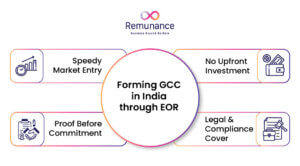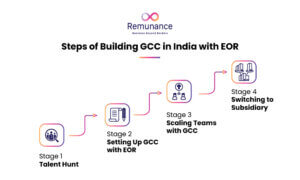Why Global Companies Are Setting Up GCCs in India Through the EOR Model?
GCC in India is a fully owned branch of a multinational company expanding into the Indian market. Businesses these days are setting up GCCs in India by partnering with EORs. This model has proven to be the fastest and most efficient of all. It allows you to test the market without entity setup.
📑 Table of Contents
India is stepping into a strong new cycle of global relevance. It’s not just a cost-effective location for business expansion anymore. It’s becoming a hub for talent, capability, and innovation.
That’s why founders and CEOs across the US and Europe are looking at India differently now.
They’re not just setting up offshore teams anymore. They’re building Global Capability Centers (GCCs) in India to support brand building and business growth.
But there’s an obstacle in this journey in the early phase. What is it?
Well, starting with a full-fledged subsidiary in a new country is nothing but complex. And, there’s an easy answer for this.
The EOR model. It helps you hire, manage, and scale teams fast without the tedious setup process.
Here’s what we’ll be covering in the blog:
-
- What GCC in India means?
- Why companies are using EORs to build them?
- How this model differs from setting up a subsidiary?
- The steps and benefits of forming GCC with EOR.
- Comparison of forming GCC through EOR with outsourcing.
- And lastly, why Remunance is a great EOR partner, and what’s next for GCCs in India?
So, let’s start. Shall we?
What is GCC in India?
A GCC in India is a fully owned branch of a multinational company that handles end-to-end business services from India.
They’ve come a long way from the old support office tag.
Today’s centers run serious, business-critical stuff like R&D, engineering, product builds, the works. And India? It’s pretty much the global headquarters for GCC excellence now.
These hubs are stepping up as full-on Centers of Excellence that push significant impact for their parent companies.
Many people confuse this model with an outsourcing setup, which it’s clearly not.
It’s like your company’s own extended branch. It has the same goals and mission as your business, but operates in a different country.
Until a few years ago, these centers were primarily used for cost savings and IT support. Back then, GCCs were built for only back-end support for the business. But things have changed now.
Now, global capability center companies in India are at the front line of innovation. They’re driving product design, data analytics, automation, and R&D, along with supporting global operations.
So why are companies rushing to set up GCCs in India?
The answer is India’s diverse ecosystem. The country has a large STEM talent base, a robust digital infrastructure, and strong business policies. Pretty lucrative deal, right?
Also, GCCs in India are known for their cultural adaptability and inclusivity.
Key Features of GCCs in India
1. Strategic team building
Modern-day GCCs not only manage remote teams but also help build and strengthen them.
2. Effective multitasking
Today, GCCs manage everything from HR and admin to IT and finance for global companies.
3. Flexibility
GCCs manage your team, but the strategic decisions for your team are still up to you.
4. Talent magnet
The work model of GCCs effortlessly attracts and retains top talent.
5. Spread network
GCCs are no longer limited to metro cities. They’re gradually getting popular in Tier-2 and Tier-3 cities as well.
6. Economic Shift
GCCs create multiple job opportunities in the country, boosting India’s tech economy.
Now that we’ve clarified the GCC in India concept, let’s see why it has a strong partnership with EORs.
Still curious about whether to set up GCCs in India?
Consult with our experts to clear your confusion.
Why International Companies Are Forming GCC in India through EORs?

Traditionally, businesses had only one option for establishing a global capability center in India. By setting up a subsidiary company in India. But that is the thing of the past now. Companies aren’t rushing to set up subsidiaries anymore.
A relatively new and promising model has become the new favorite for these companies. Yes, I’m talking about the Employer of Record (EOR).
Why? Because it’s faster, safer, and way more flexible.
It goes without saying that forming a legal entity in India takes time. Remember, you’re dealing with:
-
- Entity registration and compliance approvals
- Local tax and labor law filings
- Bank account setups and payroll registrations
- Audits and statutory reporting
Each step adds weeks, sometimes months, before you can even hire your first engineer or analyst.
But not with the EOR model. It deviates from all the complexities of the traditional GCC process.
Instead of starting with a legal entity, you start with a team. The EOR takes care of employment, payroll, compliance, and benefits while you focus purely on operations.
Here’s why global leaders are choosing this route:
-
- Speed to market: Hire in weeks, not quarters.
- No upfront investment: Avoid capital lock-in registration and office leases.
- Legal and compliance cover: The EOR ensures full statutory compliance under Indian laws.
- Proof before commitment: Test talent performance and business viability before forming your subsidiary.
In short, the EOR model lets you validate your GCC strategy before you build the structure.
Many US and European companies are already using this model.
As a result, they’re scaling agile and building cost-efficient teams in India. At the same time, they’re keeping their global expansion flexible and risk-free.
Once the GCC proves its success? You can transition smoothly into your own subsidiary with data, experience, and zero complications.
Learn how to reshape your business expansion with EOR.
What’s the Difference between Setting Up a GCC in India through an EOR and through a Subsidiary?
As we saw in our last section, there’s a quiet revolution happening in how global companies enter India.
While some are still taking the traditional route of forming a subsidiary, others are taking the easier and practical approach. Partnering with an Employer of Record (EOR).
Both lead to a Global Capability Center (GCC) in India, but they’re poles apart from each other. Let’s see how.
| Parameter | Traditional Subsidiary GCC | GCC via EOR Model |
| Time to Go Live | Usually 4–8 months due to company registration, banking, and compliance clearances. | 2–4 weeks. Instant setup through an EOR’s existing legal infrastructure. |
| Compliance Load | Heavy. Involves tax registration, labor law compliance, and ongoing audits. | Zero compliance burden. Handled entirely by the EOR. |
| Ownership & Liability | Full ownership, but also full liability from Day 1. | No direct liability. EOR absorbs all employment and regulatory responsibilities. |
| Scalability | Difficult to downsize or change team composition quickly. | Highly flexible. Scale teams up or down based on business traction. |
| Initial Investment | High. Involves capital, office lease, and legal setup costs. | Minimal. Pay only for employees and services you use. |
| Strategic Agility | Slower. Rigid structure not ideal for early-stage market testing. | Faster. Ideal for testing and validating India strategy before entity formation. |
| Operational Control | Full operational and legal control from start. | Shared model. Operational control stays with the company; legal control with the EOR. |
| Exit Flexibility | Complicated. Shutting down a subsidiary involves lengthy closure procedures. | Seamless exit. Simply offboard employees with notice as per EOR terms. |
So, setting up GCC companies in India via a subsidiary makes sense once you’ve validated your market and team potential.
But for most early-stage or growth-focused firms, starting with the EOR route to build a Global Capability Center in India is more practical and less risky.
What Are the Steps of Building GCC in India with EOR?

If you’re planning to set up GCCs in India, let’s introduce you to the most efficient way to do so. It starts with choosing the right employer of record partner.
This 4-stage approach helps global companies set up GCCs in India without any legal or financial trouble.
-
- Stage 1: This is the phase for talent searching and shortlisting.
- Stage 2: This stage is all about setting up GCC in India with the help of an EOR partner.
- Stage 3: In this stage, you start your operations in India smoothly and start scaling your team.
- Stage 4: By this stage, you’re confident about running your business in the Indian market and are ready to shift into your own subsidiary.
Stage 1: Talent Hunt and Market Mapping
This is your groundwork phase. You explore India’s talent landscape and map it to your business needs.
-
- Identify the right skills and roles for your GCC.
- Benchmark salaries, hiring timelines, and availability.
- Understand cultural compatibility and retention trends.
This step ensures you’re not hiring blindly and have clarity throughout the entire recruitment process.
Stage 2: Pilot GCC Build
This is the next crucial step of setting up GCCs in India. Suppose a US-based SaaS AI firm is starting with a 25-member tech and QA team. What should their ideal setup journey look like?
-
- The founder manages product direction and team culture directly.
- The EOR partner (like Remunance) handles compliance, payroll, and HR operations.
The result? The firm retains full control while staying free from legal complexity.
Stage 3: Scale Phase
Once the model proves itself, it’s time to scale. Your GCC team grows gradually from 15 to 50 to 100.
-
- The scaling phase includes recruiting new talent for more strategic roles like Data, DevOps, Product, and Customer Ops.
- Make sure your work culture and business goals doesn’t get diluted during expansion.
This is how you sustainably and not impulsively set up global capability centers (GCCs) in India.
Stage 4: Transition to Subsidiary
After being operationally successful, you’re ready to start your own entity.
-
- Transition smoothly from EOR to a wholly-owned subsidiary.
- This process has no disruption and needs no re-hiring.
With the EOR approach, setting up GCCs in India becomes a smooth, flexible evolution rather than a risky leap.
Remunance Employer of Record
Ready to Build Your GCC in India the Smart Way?
Set up, scale, and transition into your own subsidiary—without legal, hiring, or compliance headaches. With Remunance as your EOR partner, you get a risk-free, cost-efficient, and fully compliant pathway to build your GCC in India from Stage 1 to Stage 4.
Let’s Start Your GCC Journey Today
What Are the Benefits of Building GCC in India with EOR?
As we saw in earlier sections, building a GCC in India through an employer of record seems like an easy shortcut.
However, it’s much more than that.
It’s the safest way to test a highly diverse market like India and expand your team here.
You get talent, control, and flexibility without the weight of a full entity setup or long-term commitment.
Here’s what makes this model stand out:
-
- No slowdown, no distractions: You keep your global momentum while your EOR handles payroll, contracts, and local HR formalities.
- Zero hand-holding on compliance: Forget explaining India’s complex tax, labor, or statutory processes. Your EOR is already an expert in that.
- Speed-to-talent advantage: EORs have profiles of engineers, data experts, and R&D experts in their database. Thus, hiring happens in weeks, not months.
- Risk-free setup: You can validate your India operations without committing capital to an early entity setup.
- Agility comes in handy: Scale teams up or down based on business phases. You won’t have any long-term overheads attached here.
- Founder-led freedom: Founders and CTOs can directly lead teams in India while the EOR manages all backend administration.
- Faster learning curve: You build operational insights from day one, before taking the full plunge into incorporation.
- Capital protection: Spend on people and innovation, not registrations and compliance documentation.
- Suitable for modern businesses because:
-
-
- Founder-led startups gearing up for growth.
- US SaaS companies speeding up product development.
- European tech firms looking for firmware, AI, or chip experts.
- PE-backed firms exploring India before setting up an entity.
-
Global capability center companies in India are no longer waiting months to go live. With the EOR-led GCC model, you can start your operations in no time.
Your to-do list will only be filled with growth strategy and not tedious repetitive mandates.
How is Building GCC in India Different from Outsourcing?
Let’s establish the fact loud and clear, operating through GCC in India is not outsourcing.
When you build a GCC in India, you’re not handing off work. You’re taking control of everything, including the team, culture, and output. The EOR is just the legal body so you can start fast, without entity hassles.
Everything else like strategy, direction, innovation, stays fully yours.
Here’s how it works differently than outsourcing:
-
- Full ownership, not delegation: You’re not sending tasks to a vendor. You’re building your own in-house team under your brand, your leadership, your culture.
- Direct control of outcomes: Unlike outsourcing, where delivery timelines and quality depend on third-party management, a Global Capability Center in India works directly for you.
- Long-term capability building: GCCs focus on innovating and adding creative value to your business, and not just transactional work.
- Brand continuity and IP protection: Your brand, your processes, your data security, all stay within your ecosystem.
- Speed without the legal setup delay: With an EOR structure, you skip the 6–8 month entity setup. You start within weeks while staying compliant.
Now, how is outsourcing different?
-
- It’s about contracts, not commitment.
- The team works for a vendor, not for you.
- The focus is on cost reduction, not capability creation.
- The culture belongs to the service provider, not your organization.
That’s why most global CEOs now see the Global Capability Centers in India as their next growth engine and not just a cost base.
Because with a Global Capability Center in India, you’re not outsourcing work. You’re expanding your company’s DNA directly into the world’s most talented market.
Read the complete guide to HR outsourcing for global businesses.
Why Remunance Is the Perfect EOR Partner for Building GCC in India?
Building a GCC in India is not merely outsourcing tasks to a third party. It’s about ownership, alignment, and control.
And that’s exactly what global companies like Medtigo and Interval Zero found when they partnered with Remunance.
Here’s why they trusted Remunance to power their India story:
-
- Local expertise, global vision: Medtigo, a Massachusetts-based healthcare lifestyle company, wanted to expand globally. They saw India’s skilled and tech-savvy talent pool as the perfect fit. But they needed an on-ground expert who understood the market, compliance, and culture. Remunance became that partner.
- Customized EOR Solutions for Smooth Scaling: Starting with just a digital marketing team, Remunance helped medtigo build a strong foundation. Soon, HR, finance, operations, and tech teams followed. With customized EOR support, IT infrastructure, reimbursements, and compliance management, Remunance made scaling effortless.
- From EOR to Subsidiary Success: Within two years, Medtigo’s India team grew to over 40 members. With Remunance’s guidance, they confidently transitioned into a wholly-owned subsidiary. That was a true sign of success for any global capability center company in India.
“Remunance was our true partner from day one. We’ll always consider them a part of the medtigo family.” —Rick and Susan, Founders, medtigo - Building Culture, Not Contractors: For Interval Zero, a Boston-based software firm, Remunance played the same role. The role of bridging culture and compliance. While the team was technically employed by Remunance, they operated smoothly under IntervalZero’s leadership.“Remunance provided a cozy office, helped us build culture, and improved retention.”
Today, both medtigo and Interval Zero have transitioned to their own subsidiaries but continue to rely on Remunance’s local knowledge and operational support.
That’s what makes Remunance the go-to EOR partner for global capability center India success stories.
Discover Why Global Companies Trust Remunance
Explore our success stories, proven expertise, and see why we’re recognized as a thought leader in the Indian EOR market.

What Is the Future of Businesses Building GCC in India?
The future of businesses setting up GCCs in India have a long way to go in the Indian market. They’re here for long-term, ot flourish in the market in style.
The next generation of global capability center companies in India won’t start by forming a subsidiary first.
They’ll start lean, with an EOR model. Now that they’ve witnessed this model to be an absolute winner, there is no going back.
Let’s see what the future of these businesses looks like:
-
- EOR will become the norm for every business building GCC in India. While EOR takes care of the entire GCC setup and operations post setup, they can solely focus on branding and revenue generation.
- Founders will focus on integrating the core company culture early. They will focus on leadership and work ethics from Day 1. EORs are making that possible by automating manual tasks.
- Businesses will now stabilize operations before entity investment. Once the talent base and workflows are strong, converting into a formal entity becomes a natural rather than a forceful next step.
- As EORs help to set up GCCs in India faster than any other model, it gives businesses the leverage to bond and make a good employer-employee connection with the team.
- As the EOR partner lays out a transparent budget for setting up GCCs in India, there are no hidden costs involved in the process. This allows founders to plan their expansion better.
The new global capability center India strategy is merely about rushing to incorporate. It’s about building intelligence into the sequence.
It’s about creating a defined and much smarter roadmap to enter the Indian market and build a strong team here.
Conclusion
Building a GCC in India through an EOR isn’t a shortcut; it’s a smart strategy.
It helps you move fast, learn faster, and build a strong cultural foundation without heavy upfront investments.
For global capability center companies in India, this model protects capital while testing scalability.
Once the team and direction stabilize, you can easily transition to a full entity setup.
The EOR approach is the ideal Phase-1 entry for any business serious about long-term growth in India’s talent market.
It’s the new, low-risk way to build your global capability center in India quickly and with confidence.
FAQs
What is GCC in India?
A GCC in India is your company’s fully owned branch that manages end-to-end operations and an extension of your core business. Once built mainly for cost savings and IT support, today’s GCCs drive strategy, innovation, and global growth.
Why should you set up GCCs in India through an EOR?
Global companies are setting up GCCs in India through EORs for faster market entry, zero upfront investment, and full legal compliance. It’s the smart way to test talent and validate business potential before committing to a subsidiary.
How is it different from outsourcing?
Outsourcing is driven by contracts, costs, and vendor control, not by ownership or culture. The team answers to the service provider, not your company, so capability building takes a backseat.
Why are GCCs growing in India?
GCCs are growing in India due to a vast talent pool, advanced tech infrastructure, cost-efficient locations, and government-friendly policies.
How to setup GCC in India?
To set up GCCs in India, you need to research on location, costs, business goals, talent availability, etc.
Related Posts

7 Benefits of an Employer of Record Services

How EOR Services in India Protect You from Compliance Risks

